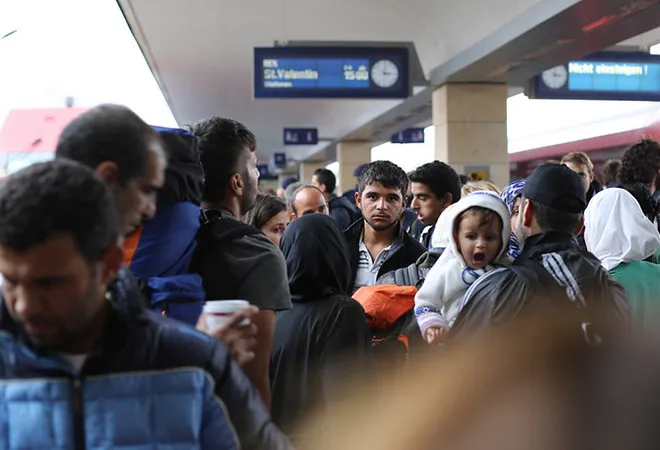-
CENTRES
Progammes & Centres
Location
Syrians may not be able to return home for a variety of reasons, but in conversations, many of them express a deep longing for their country.

Ten years ago a few children drew anti-government graffiti in the city of Daraa in southwestern Syria. They were arrested by the local Mukhabarat or intelligence and allegedly tortured. The photos of the swollen corpse of 13-year-old Hamza al-Khateeb, allegedly tortured by Syria’s security services triggered the Syrian uprising. Soon enough the protests were curbed and a civil war began that culminated in the destruction of major cities and forced half of Syria’s population to flee.
While over a million Syrians found refuge in Europe, a large number of the 5.5. million Syrian refugees are languishing in camps in Lebanon, Jordan, and Turkey. They have had enormous difficulties in finding work, faced insurmountable obstacles in obtaining legal residency, and have been the worst affected by the pandemic-induced unemployment as well as by economic crises in their host countries. Yet they say they are better off outside Syria and cannot return.
Whether in Europe or any of the neighbouring countries, most of the Syrians are worried about returning under the same dispensation that they feared all their lives. Many refugees accuse Bashar al Assad’s government of indiscriminately bombing entire cities, laying starving sieges, and illegally detaining, disappearing, and even executing thousands of opposition members. They fear that they might be punished for ideologically supporting the opposition or might be treated as traitors for merely fleeing the country.
According to a report released by the United Nations High Commissioner for Refugees (UNHCR), the United Nations Children’s Fund (UNICEF), and the World Food Programme (WFP) called Vulnerability Assessment of Syrian Refugees in Lebanon 2020, 89 percent of Syrians live below the poverty line. That is up from “55 percent only a year before.” The report added that 91 percent of Syrian refugee households remained food insecure to some degree while many resorted to sending children to work, married off their girls before they turned 18, and cut down on meals. But just 2 percent of households reported the return of any of the family members to Syria.
They have challenging circumstances in host countries, to say the least, and yet they refuse to leave. Whilst they fear a threat to their security upon return, three major worries remain underreported.
The destruction of their homes, neighbourhoods, schools, and colleges, and the refusal of the West to rebuild Syria is a major reason stopping Syrians from returning. They are terrified of the economic crisis that had engulfed the country when the war started but that has worsened since the West’s sectoral sanctions adversely impacted the few industries that were still standing. The economic crisis and concomitant hyperinflation have rendered Syria uninhabitable for many who might otherwise have liked to return.
The other big fear is punishment for fleeing mandatory conscription. Most of the Syrian refugees scattered around neighbouring countries and Europe are men and most of them fled the military service. They did not want to die in a war that they did not believe in. They did not want to kill compatriots either. If they return, they fear they might be tried in military courts and treated as traitors for deserting the mandatory military service. At the very least, they would have to pay a hefty fine and join the armed forces. But if the Syrian government were to declare lifelong amnesty, some of the men might return or at least visit. But repealing mandatory draft is not even mentioned in UN resolution 2254 which is backed by the western countries.
Reports of expropriation of their homes and properties by government-supported militias have further added to the concerns of refugees. Under Decree 10, the Syrian government is redeveloping large parts of the country destroyed in the war, but activists allege that homes of Syrians who opposed the government are being confiscated.
Syrians may not be able to return home for a variety of reasons but in conversations, many of them express a deep longing for their country. One day when things are better they would like to go back to their homeland but no one knows when that might be. In the interim, sanctions are punishing the Syrian people and not the Assad government. Blocking reconstruction is only blocking refugee returns, not expediting Assad’s ouster.
The views expressed above belong to the author(s). ORF research and analyses now available on Telegram! Click here to access our curated content — blogs, longforms and interviews.

Anchal Vohra was a Fellow at ORF. She writes on contemporary developments in West Asia and on foreign policy.
Read More +